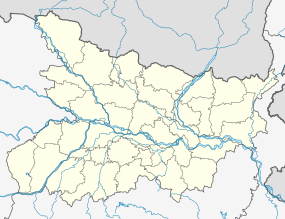Rampurva

Bull capital at Rampurva, one of the Pillars of Ashoka, 3rd century BCE.
|
|
| Location | West Champaran district, Bihar, India. |
|---|---|
| Coordinates | 26°50′34″N 84°41′46″E / 26.8429°N 84.6960°ECoordinates: 26°50′34″N 84°41′46″E / 26.8429°N 84.6960°E |
| Type | Settlement |
Rampurva is an archaeological site in the West Champaran district of the Indian state of Bihar, situated very close to the border with Nepal. It is known for the discovery of a pair of Ashoka Pillars in c. 1876 by A.C.L. Carlleyle.
Waddell in 1896 suggested that the death and parinirvana of Gautama Buddha was in the region of Rampurva: "I believe that Kusīnagara, where the Buddha died may be ultimately found to the North of Bettiah, and in the line of the Açōka pillars which lead hither from Patna (Pāțaliputra)." Modern scholarship, based on archaeological evidence, believes that the Buddha died in Kushinagar (Uttar Pradesh).
The Rampurva bull capital is noted as one of the seven remaining animal capitals from the Pillars of Ashoka. It is composed of a lotiform base, with an abacus decorated with floral designs, and the realistic depiction of a zebu bull.
The abacus in particular displays a strong influence of Greek art: it is composed of honeysuckles alternated with stylized palmettes and small rosettes. A similar kind of capital can be seen at the basis of the Sankassa elephant capital. These design likely originated in Greek and Near-Eastern arts.
Rampurva bull excavation in 1907
Rampurva lion excavation in 1907
...
Wikipedia


